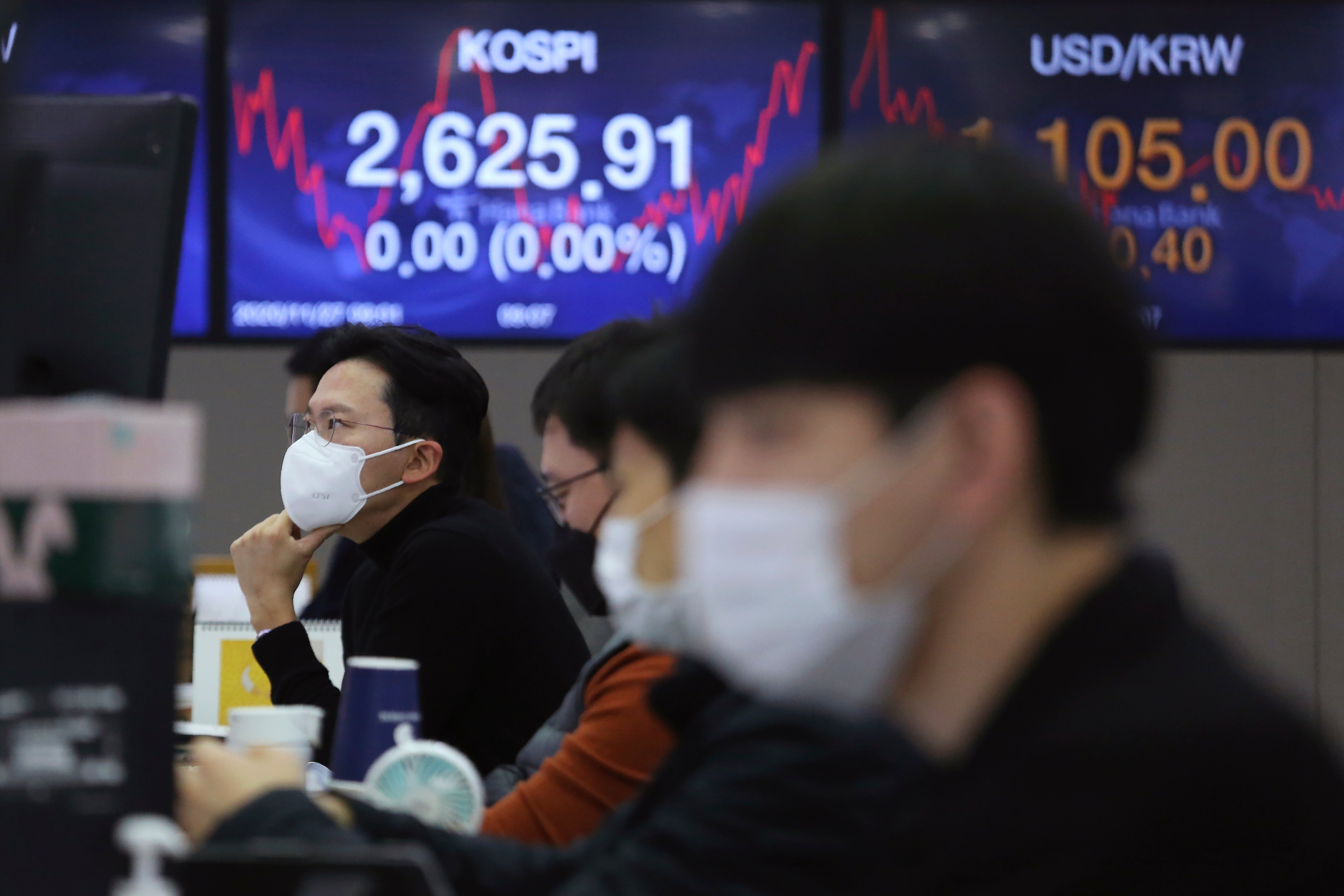Asian shares mixed despite record high S&P 500
Asian shares are mixed on renewed caution despite a record high finish on Wall Street last week driven by hopes for a COVID-19 vaccine and relief for the global economy

Your support helps us to tell the story
From reproductive rights to climate change to Big Tech, The Independent is on the ground when the story is developing. Whether it's investigating the financials of Elon Musk's pro-Trump PAC or producing our latest documentary, 'The A Word', which shines a light on the American women fighting for reproductive rights, we know how important it is to parse out the facts from the messaging.
At such a critical moment in US history, we need reporters on the ground. Your donation allows us to keep sending journalists to speak to both sides of the story.
The Independent is trusted by Americans across the entire political spectrum. And unlike many other quality news outlets, we choose not to lock Americans out of our reporting and analysis with paywalls. We believe quality journalism should be available to everyone, paid for by those who can afford it.
Your support makes all the difference.Asian shares were mixed on Monday on renewed caution despite a record high finish on Wall Street last week driven by hopes for a COVID-19 vaccine and relief for the global economy
Japan's benchmark Nikkei 225 was up less than 0.1% at 26,657.18. Other markets quickly lost early gains, with South Korea's Kospi down 0.3% at 2,624.86. Australia's S&P/ASX 200 slipped nearly 0.8% to 6,550.80. Hong Kong's Hang Seng edged down 0.2% to 26,848.91, while the Shanghai Composite rose 1.3% to 3,451.31.
Stephen Innes, chief global market strategist at Axi, noted that despite ups and downs investors are looking toward the arrival of vaccines for a gradual return to business as usual.
“Vaccines offer the promise that the major disruptions of the pandemic will fade from the scene in 2021. Economic life will gradually heal; the world will start to move on from all the human suffering that the virus has wrought,” said Innes.
One bit of encouraging news for the region came in the purchasing managers’ index, or PMI, for China’s manufacturing sector, which showed the nation where the pandemic all started continues to recover, with its manufacturing sector growing.
In a half day of trading that finished the week on Wall Street, the benchmark index S&P 500 rose 0.2%, led by gains in technology companies, closing at an all-time high of 3,638.35. The Nasdaq also set a record, helped by gains in Apple, Tesla, Zoom and other tech companies.
Positive developments on the vaccine front have driven double-digit gains in the major indexes this month as investors look forward to progress in gaining control over the pandemic that plunged the global economy into its deepest slump since the 1930s. That optimism persisted last week even as one vaccine candidate suffered a setback and cases of coronavirus remain high around the world.
The Dow Jones Industrial Average, which earlier this week crossed 30,000 for the first time, rose 0.1% to 29,910.37. The Nasdaq gained 0.9% to 12,205.85.
The University of Oxford and AstraZeneca have released positive test results about their vaccine. Hopes for a vaccine have offset concerns about spiking coronavirus cases in the U.S. and other parts of the world. U.S. states and European governments are re-imposing controls on business and travel as infection rates surge.
Worries are also growing in Asia, including Japan and South Korea, about another wave of infections. Tokyo is reporting several hundred new cases a day, often setting new records. The disease has killed more than 1.4 million people worldwide, according to data gathered by Johns Hopkins University.
The OPEC nations led by Saudi Arabia, will be meeting virtually on Monday to decide, once again, how much oil their members should produce as lockdowns related to the coronavirus stifle demand for crude. They’re expected to extend production cuts well into the new year, in an effort to boost volatile oil prices.
The group has to reach agreement among its member countries and the additional members in the group known as OPEC Plus, which is led by Russia.
In energy trading, benchmark U.S. crude lost 48 cents to $45.05 a barrel. Brent crude, the international standard, also fell 48 cents to $47.70 a barrel.
The U.S. dollar inched down to 103.89 Japanese yen from 104.07 yen. The euro cost $1.1974, up from $1.1962.
___
Yuri Kageyama is on Twitter https://twitter.com/yurikageyama